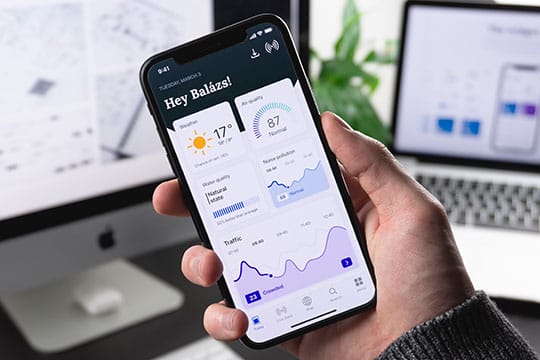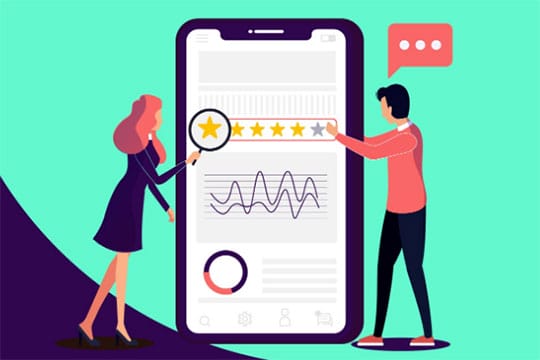We have got an app for almost everything; an app for dating, travel, food, books, hotel, connect to lost friends and strangers. So, what is stopping you? Why don’t you have an app for your business? No matter how large or small your business is, an application is a must for every type of business irrespective of your business scale. We are not here to debate over why your business needs an application; we assume that you are well aware of its benefits. However, we are here to discuss the two vital types of applications that can be important for your business. We are talking about web apps and cloud apps.
Web app or cloud app, which is better? There is no particular answer to it, as it is a never-ending debatable topic. Let us delve further to know what both the web app and cloud app offers, so you can decide which one can be best for your business.
What is a web application?

A web application is a software that runs on a web browser; it is programmed using the client-side script and server-side script. It facilitates the opportunity to use it from anywhere as it is functional through the internet.
Recommended for you: How the Prosperity of Business Depends on Enterprise Application Integration?
Types of web apps

1. Dynamic web app

Dynamic web apps generate data according to a particular reaction that triggers from the server end. And then the end-user will get updated content accordingly. Different programming languages are used to create dynamic apps and PHP & ASP are a common one. Further, CMS is used for creating and modifying content. Some famous examples of web apps include Facebook, Twitter, Google, etc.
2. Static web app

Static web apps are developed using CSS, JavaScript, and HTML with limited content options and flexibility. They are best in case of limited information requirements and where there is no requirement for interaction. It is ideal where GIFs, animated objects, and videos are involved. Some examples of static web apps: landing page for marketing, professional portfolios, etc.
3. Web apps with CMS

In this type, content is continuously changed and updated. The administrator is responsible to change and update the content. This kind of app is widely used for news pages, media, blogs, and more. The popular examples of CMS web apps include Drupal, WordPress, Joomla.
4. Portable web app

It is referred to as a web app where users can access and use different sections or categories through a home page. Here only members access the content of the web portal. It includes email, chats, web browsers, etc.
5. Animated web app

An Animated web app is useful to hold the audience’s attention and best to highlight the relevant information. Animated web app is created using CSS animation & transition, JavaScript, or WebGL. Mostly the creative agencies or freelancers use it to enhance creativity.
6. e-Commerce

An ideal e-Commerce app should be optimized for both mobile and desktop browsing to get fruitful results. It has a complex development process as it includes electronic payment through PayPal, credit cards, or any other payment methods. The developer must create a management panel for the administrator for listing, updating, or removing products.
Benefits of web application

1. Anywhere accessible

Working in a particular place in front of a single system becomes outdated with web applications. The beauty of a web application is that it can be accessed on PC enabled with an internet connection from anywhere. Web applications facilitate possibilities like work from home, global teams, and real-time collaboration.
2. Cost-effective option

A web application is a cost-effective solution as users access the system using a single environment, i.e., a web browser. Here testers do not have to test it on different platforms, which further reduces development cost and saves time.
3. Highly deployable

Due to cross-platform support and manageability, it becomes easy to use by end-users. Here the user needs internet access, put login details and they are ready to go. With it, it is easy to streamline processes, improve relationships by providing something extra to customers.
4. Highly efficient

With in-built user tracking, it becomes easy to track the usage pattern. It helps to provide personalized recommendations and push notifications to users. The personalized services help to keep customers and thus add more profits to the business.
5. Fast development

Web apps are developed using JavaScript, CSS, and HTML. These are easy to code compared to other scripts. With multiple frameworks used by developers, it becomes easy for developers to develop web apps quickly and trouble-free.
What is a cloud application?

A cloud application is almost similar to the web app, but its functionalities are different from others. It is operated using the cloud data, plus it can be accessed through offline mode. So, basically, a cloud app is the combination of a traditional web app with a standard of the web app.
Since these apps are operated using cloud storage, it occupies less storage space. Its famous examples include Dropbox, Salesforce, Evernote, etc.
You may like: Step to Implement Any iOS App as an iMessage Application.
Types of cloud apps

1. Software as a Service (SaaS)

It is a cloud-based application where you can get access using an internet connection and login details. It is available on the external server instead of an in-house located server. For using it, users need not install or update any software. The major types of SaaS applications include HR, business intelligence, CRM, help desk, accounting, and ERP. Popular examples of SaaS include Sisense, HubSpot CRM, and Wix.
2. Platform as a service (PaaS)

It is an advanced computing platform that provides platform infrastructure solutions to the business to build its own solutions. Examples of PaaS Force.com, Apache Stratos, OpenShift, etc.
3. Infrastructure as a Service (IaaS)

It is an outsourced cloud-based computing software that gives freedom to clients on how to use these cloud services. As the name suggests, it provides the infrastructure to the client that can be fully managed by the service provider. Popular examples of IaaS include Microsoft Azure, Amazon web services, and Google Compute Engine.
4. Recovery as a Service (RaaS)

It is also known as “Disaster Recovery as a Service”. Because it is used to protect the application from natural and human disasters. RaaS enables the app to fully recover in the cloud. It is expected that by 2023, the worldwide market for RaaS will reach 13 billion dollars.
Recommended reading: SaaS vs PaaS vs IaaS: Advantages, Disadvantages & Comparison.
Advantages of cloud app:

1. Security

Cloud apps are more secure and reliable compared to desktop applications. Here users do not put the business at risk; they do not have to face the threat of installing malware. Even if the app countered any vulnerability, it can be fixed at the earliest; with a refresh button, the problem can be solved.
2. Cut down software licensing cost

Traditional apps cost a fortune to the business as the vendor charges huge licenses, upgrade, and support fees. However, cloud apps are subscription-based, where a fixed amount needs to be paid for each user. Even if the user does not wish to continue the use of software, it exports data and can migrate to a different solution.
3. Reduced management costs

Another benefit of the cloud app is its improved security and greater control. This reduces the managing cost of the essential business. With the outsourcing option, the business can appoint fewer people in-house IT teams to reduce management costs.
4. Fast response

If you wish for a speedy app, then the cloud is the right choice. It can update, test, and deploy quickly, which buys enough time for quick marketing and agility.
5. Control

With a normal app, you need to install, update, and manage business applications on every desktop that the business owns. However, with cloud applications, there is no need to install and maintain applications. They can be easily accessed from anywhere, offer data control, fine-grained, and centralized users.
6. API use

With the help of API, storage services and third-party services can be accessed. Cloud apps can be kept small with the help of API (Application Programming Interface). Vetted APIs can help in speedy development along with yield predictable results.
Difference between web apps and cloud apps:

Technologies

The cloud-based app is built using a powerful backend framework called JavaScript. For enabling users to visit the app without using the Internet, it uses HTML5 offline caching feature.
In the case of web apps, it is built using backend languages like .NET, PHP, Ruby, Python, supported by databases such as MySQL, PostgreSQL, and many others.
Origin

The main difference between a cloud-based app and a web app is its origin. The “web app” term was coined earlier than cloud apps. The latter was introduced into use to differentiate new generations of apps when developers started using front-end framework JavaScript.
Costs

On comparing traditional web browser apps to the web-based application, it leads to high cost due to its offline feature. While comparing cloud-based and web-based apps, cloud-based can be substantially more costly. This is due to the limited availability of developers with requisite skills and teams.
Services

Let us try to understand service from a non-technical person’s viewpoint. Web apps are those that require continuous internet connection, otherwise, it will not work, for instance, YouTube, Amazon, and Airbnb. However, in cloud apps, you can expect them to work offline and sync in the background when the internet gets restored.
Use cases

Cloud-based apps should be a choice where heavy calculations are involved or where Internet connectivity is unsteady. Because, cloud apps work efficiently, even in the case of partial or fully offline conditions. Cloud apps are also a priority for many collaboration-heavy processes.
In the case of web apps, the Internet is a must. They are a great choice for transaction apps such as booking services, banking services, e-commerce websites, and information sharing portals.
You may also like: Top 10 Fast-Growing SaaS Applications to Follow In 2020.
Concluding words

Depending on the size, budget, team size, and nature of the business, cloud app and web applications offer different uses. Based on the requirements of the business, you can select anyone wisely. In case of any confusion, you can take help from a web app development services advisor to get better clarity.
This article is written by Multipz Technology. Multipz Technology offers a one-stop-solution for web design, web development, custom development, mobile app development, and AI development services. Our experts help global brands, enterprises, mid-size businesses, or even start-ups with innovative solutions. Follow them: Twitter | LinkedIn.





